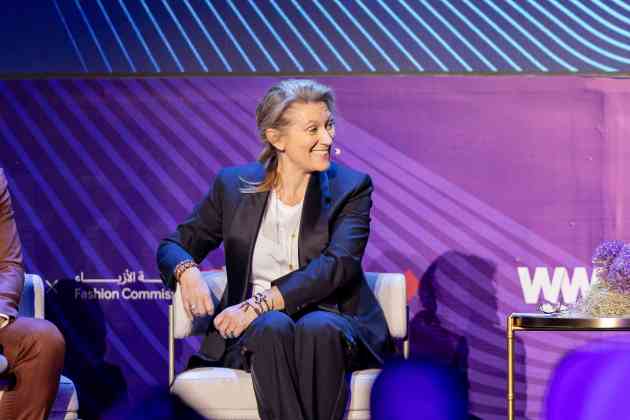Kering Is Committed to Developing Innovations in Sustainable Materials and Business Models

As the luxury industry navigates its sustainability transformation, Kering is leading by example —nurturing disruptive innovation and fostering cross-industry collaboration. At the WWD Global Fashion Summit in Riyadh, Kering’s chief of sustainability and head of international institutional affairs Marie-Claire Daveu shared the company’s strategy to transform the industry during a conversation with Miles Socha, WWD’s international editor.
“At Kering we say it’s one and the same, sustainability and luxury,” she said. “Last year we took a big commitment to reduce by 40 percent our greenhouse gas emission by 2035.”
More from WWD
The key driver to meeting that target, she said, is innovation. “Sustainability and innovation go hand in hand. It’s about changing business models and the way you are thinking. We need disruptive innovation at every stage, from raw materials to end of life. And in the luxury sector, we need those to be the highest standard of quality.”
One of the first issues she addressed in the talk was overproduction. “In Kering, we have a strong policy to enhance value over volume. In the future, artificial intelligence will be a great support to say how much quantity we have to produce. In the future we will have less unsold products.”
Developing raw materials at scale will be a key pillar to reaching the group’s target. She shared that in 2013 Kering created a material innovation lab. “We now have more than 8,000 samples and 400 suppliers around the world, including 250 start-ups.”
Gucci is currently using a new material called Demetra, which is an animal-free, plant-based material. “You see that in our sneakers and in iconic bags as well,” Daveu said. “At Balenciaga two years ago, they were able to use material made from mushroom. The summer 2024 collection uses new material, which is a derivative of microorganisms, plastic free and animal free.”
The conversation has shifted a lot since she took up the role in 2012. “Millennials and Gen Z are asking more and more questions. They are interested in knowing what brands are doing in sustainability. And now the EU will have new regulations, so brands will have to have more transparency.”
She also noted that sustainability is not a marketing approach to “sell more products,” but a pillar for future growth. “We are convinced if want to develop business in the future, we have to do this.”
At the summit, Daveu previewed plans to bring Kering’s start-up accelerator program, Kering Generations, to Saudi Arabia with the Saudi Fashion Commission. This initiative will provide mentorship and resources to local innovators developing sustainable solutions for the fashion ecosystem. “If we want to reach our targets we need innovations. And we think we can bring concrete support to the start-ups. If you are able to work with luxury brands, you can work with other companies.”
Burak Cakmak, chief executive officer of the Saudi Fashion Commission, joined Daveu on stage to discuss the potential for a program with Kering. “As a commission focused on building a sustainable fashion industry, we are exploring how we can do this together and support the industry’s future. Saudi Arabia could have a global materials center on science and engineering innovations. We are thinking about how the fashion ecosystem can apply to a new industry. We want to extend the reach of this sector to engineers and scientists.”
Daveu added that a cooperative approach is the way ahead for the industry. “All human activity has an impact. We have to change the entire industry, not just our own group. We really need a collective approach to have an impact.”
Best of WWD

 Yahoo Finance
Yahoo Finance 